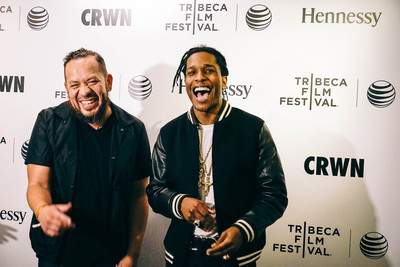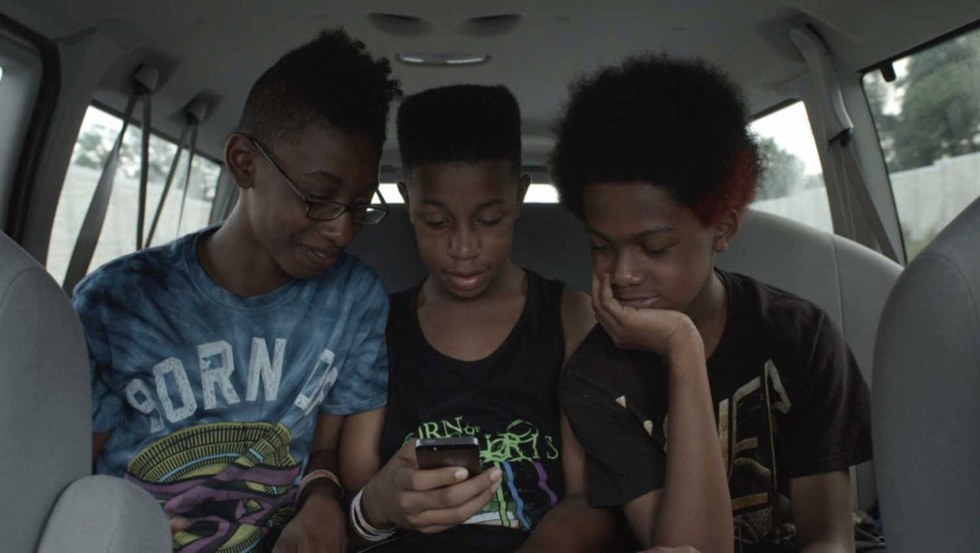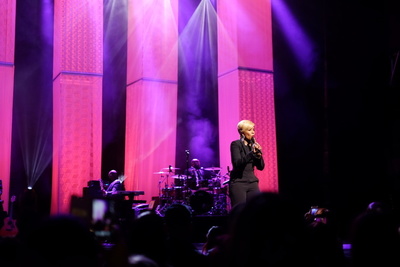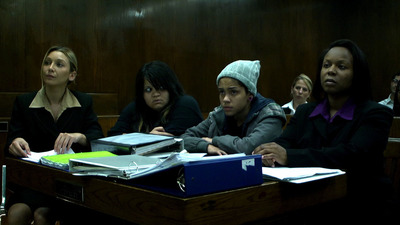
BY MATT BARONE |
DOPE and the New Doc BREAKING A MONSTER Perfectly Show Society’s Newfound Open Mind Towards Teenagers
With the indie sensation DOPE and documentary BREAKING A MONSTER, our common perceptions about teenagers are being smashed like rock stars' guitars on stages. And it's a beautiful thing.

If close-minded peers regularly surround you on a daily basis, embracing your individualism can be pure hell. But for a fifth-grader, specifically? It’s not unlike being forced to take lava baths with Lucifer himself five days a week.
That was my reality back in 1993, when I attended a preppy Catholic elementary school in the suburbs of Northern New Jersey. My classmates, all white like myself, looked like Silver Spoons extras and listened to the Spin Doctors, Nirvana, Aerosmith and the Counting Crows. I, on the other hand, was a budding hip-hop head, an anomaly in a room full of youngsters whose rap knowledge didn’t stretch far beyond MC Hammer and Salt ‘N’ Pepa. One day, I was listening to my Sony Walkman during recess when a couple of kids asked me what tape I was playing. With the reluctance of dog revealing a chewed-up shoe to its owner, I opened the portable cassette player, pulled out the tape and mumbled, “It’s Onyx’s Bacdafucup.” After looking confused, one of them said, “That’s rap music?” “Yeah,” I responded. They shrugged and walked away.
Little did I know that my confirmation would lead to them spreading the word around homeroom and, in turn, all of my classmates talking behind my back for the next year, dropping words like “wigger” and “poseur.” Just imagine if I’d told them that one of the songs on Bacdafucup was called “Blac Vagina Finda.” They might’ve fainted right there on the spot.
Later that year, I discovered Wu-Tang Clan’s amazing Enter the Wu-Tang (36 Chambers), an album that blew me away, changed my life and didn’t leave my Walkman for months after its initial entry. And I couldn’t express my excitement for RZA’s crew with any of my so-called friends. It felt like I was sitting on the world’s greatest family-style dinner spread but couldn’t find anyone to share the meal with.
My parents figured my straight-A report cards and hours spent playing hoops after school meant that my out-of-the-house life was copacetic. But it wasn’t. It was a daily see-saw of emotions, tipping towards unwarranted embarrassment and shame and then uncomfortable alienation—a load to deal with for an 11-year-old.
This weekend, two new films that triggered those memories for me will screen in New York City. They’re all about modern-day teenage individualism, and function as a kind of inverse to everything I’ve just written about here. The first is Dope, the Sundance breakout from writer-director Rick Famuyiwa (The Wood, Brown Sugar) that celebrates how three teenaged friends living in the crime-ridden “Bottoms” section of Inglewood, California, go against their high school’s rap-minded grain and play music as a band, Awreeoh, whose sound can best be described as speed-metal by way of rap/rock hybrid, a sort of variant of Pharrell Williams’ rock group N.E.R.D. (Williams wrote Awreeoh’s four songs heard in the film.) They’re from the land where N.W.A. and The Game were born, but they write songs that fans of, say, The Ramones could potentially appreciate. Like this, the humorous "Don't Get Deleted":
The second film is the documentary Breaking a Monster, which screens this weekend as part of the Brooklyn Academy of Music’s BAMcinemaFest. Directed by Luke Meyer, Breaking a Monster spends numerous months with Unlocking the Truth, a trio of African-American eighth-graders from Brooklyn who wear Slipknot and Slayer T-shirts and play heavy metal music as fiercely as the decades-older Metallica. After a YouTube video goes hugely viral, Unlocking the Truth sign a $1.8 million deal with Sony Entertainment, a whopper of a contract that becomes hot-fire news within the fickle music industry. Their haters write blogs and shoot rant-filled videos saying that the boys—Malcolm Brickhouse, Jarad Dawkins and Alec Atkins—only got their deal because white record executives treated it as a “gesture of liberal tokenism”; meaning, signing three black kids who play metal makes them look progressively open-minded.
Neither Dope nor Breaking a Monster focuses much of their respective stories to these racial perceptions. In the former, the characters talk about loving “white people stuff” in passing. The issue is more directly addressed in the latter. Meyer includes a scene where Malcolm, Unlocking the Truth’s lead singer and resident troublemaker, shows their manager, Alan Sacks (who’s worked with Demi Lovato and the Jonas Brothers) an online video blogger’s tirade about his group, which, in addition to the aforementioned “liberal tokenism” attack, includes the line, “They're young and they're black, and if you say anything critical about them, you're a heartless, child-hating racist.” Malcolm, who’s barely 13 years old, tells Sacks that he doesn’t even know what “liberal” means but also seems to agree with the video’s sentiment.
“You think that’s why you’ve been hired now?” asks Sacks.
“Yes, and I don’t care either,” replies Malcolm, with a chuckle.

Whereas most other kids his age would be devastated by such a personal assault, Malcolm lets the vitriol bounce right off of him. Earlier in Breaking a Monster, he talks about how some of his schoolmates crack jokes about him because he puts nail polish on before playing his guitar, and how their jabs don’t bother him. “I know a lot of people doubt me,” Malcolm says to director Meyer’s camera, “but I don't really listen to those people, because I know I'm gonna be famous anyway." His is an impressive level of confidence that radiates throughout the film. As someone who, as a white kid at Malcolm’s age, routinely hid away in his bedroom listening Gang Starr and Black Moon alone, I couldn’t help but look on in awe at him. He’s everything I wished I could be back in the mid-’90s.
Meyer himself was taken by the teen’s self-assuredness while filming Breaking a Monster. “You can see that Malcolm is not only aware of [the racial issues surrounding Unlocking the Truth], but that he also doesn’t care because it’s getting him what he wants,” Meyer tells TribecaFilm.com. “He understands that it’s allowing him to make music. You get to see that he’s utilizing it, and that he’s empowered by it. It’s pretty remarkable for such a young kid to see and understand all of that. Even though Malcolm has this naturally thick skin, it still sucks, of course, and it still hurts, but he’s able to push through it and turn it into a positive.”
Which, when you’re an inexperienced pre-teen or an insecure teenager, is incredibly difficult to do. Dope, though, should make it much easier to figure out for today’s young-adult moviegoers. They’ll see Dope main character, who’s also named Malcolm (played by Shameik Moore), bumping A Tribe Called Quest’s “Award Tour” in one scene and jamming out Sex-Pistols-style on his school’s gymnasium’s stage in the next, just like how there’s probably a teenager somewhere in California right now whose iPod just shuffled between YG and Fall Out Boy.
Back in my high school days, musical genres were clear-cut—rappers primarily stuck to rap and rockers never tried busting any rhymes; eventually, yes, groups like Limp Bizkit and Korn entered the scene and blurred the lines, and the Judgment Night soundtrack happened, but, for the most part, you either identified as a boom-bap lover or a mosh-pit dweller. Nowadays, however, those formerly delineated factions all exist as one. Turn on the radio and you’ll hear Maroon 5 songs featuring J. Cole verses, and EDM DJs backing MCs like Big Sean and Ludacris with techno beats. Dope is all of those modern-day artistic fusions rolled into one cultural mash-up of a movie. It’s validation for 2015’s youth whose Spotify histories include Taylor Swift next to Kendrick Lamar.
Famuyiwa, 41, grew up in Inglewood and once made a movie, titled The Wood (1999), that’s all about coming of age in his old Cali hood, except that film’s exist in ’80s-set flashbacks. To write Dope’s teen characters, Famuyiwa took inspiration from current West Coast hip-hop rabble-rousers Odd Future, whose most recognizable members, Tyler the Creator and Earl Sweatshirt, are known for albums that blend backpacker rap with ghoulishly dark production and heavy-metal-like “middle finger to the status quo” attitude. Through Odd Future, Famuyiwa realized that today’s kids don’t fit in the tired-old archetypal boxes that they were once trapped within. They’re a little bit of everything, all at once, and they’re able to groom their cornucopia-like personalities by utilizing Wild West outlets like social media and the wide-open Internet.

While developing Dope’s heroes, Famuyiwa knew that they needed to reflect these realities. “Everyone would assume these kids from Inglewood would form a hip-hop group, but I thought Malcolm would be into so many different [genres] that they would form a band that played everything," Famuyiwa told the Los Angeles Times in a recent interview. "Because of technology, there's no longer the social shaming that goes on if you're a black kid walking into a record store to buy Nirvana.”
In that same LA Times profile, there’s another Famuyiwa quote that beautifully encapsulates what makes Dope’s characters’ distinctiveness so refreshing and, frankly, important. “At the end of the day,” says Famuyiwa, “the lottery of birth shouldn't determine your value to the world.” He may as well have said that in front of Breaking a Monster’s Malcolm, Jarad and Alec. Or me back in 1993.
The other day, after seeing Breaking a Monster and aligning it with Dope in my thoughts, I did something that would’ve been impossible in the ’90s: I listened to an all-Wu-Tang mix of songs in my bedroom, all by myself. And I smiled the whole way through.
We’re living in a different age. Thank heavens there are movies like Breaking a Monster and Dope to honor that.
Breaking a Monster will have its New York premiere Saturday, June 20 at 4:00 p.m., as part of BAMcinemaFest. All three Unlocking the Truth members and director Luke Meyer will be in attendance for a post-screening Q&A. Buy tickets here.
Dope is in theaters now, via Open Road Films.

